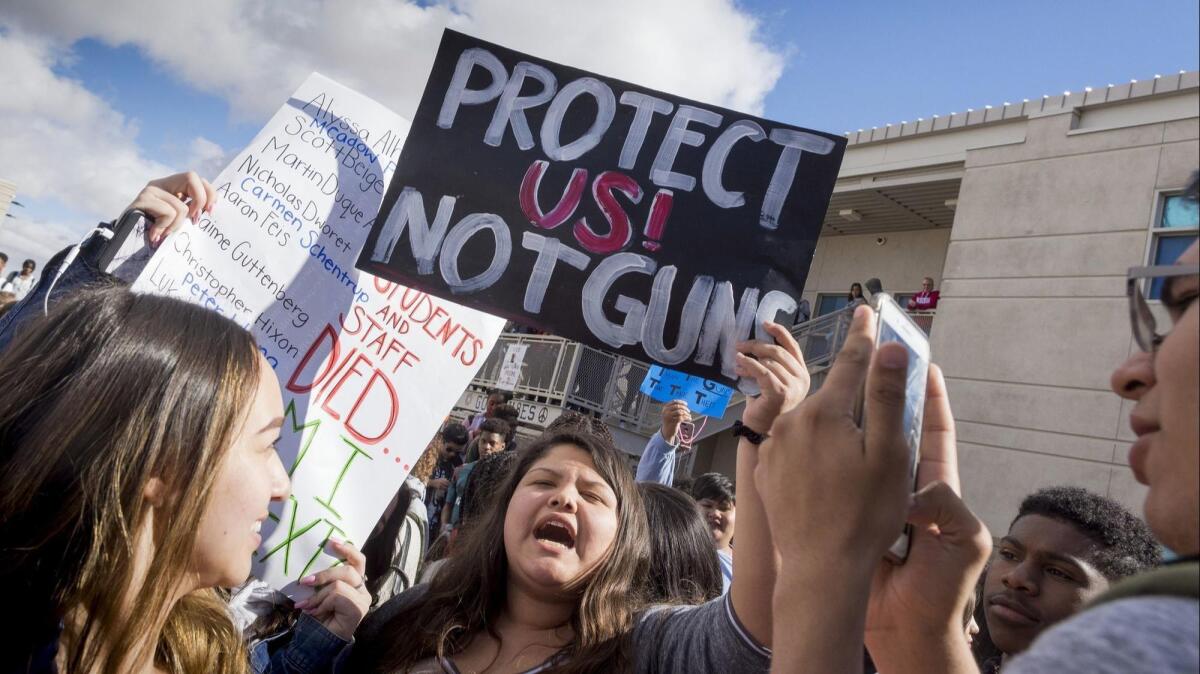After Trump backtracks, Parkland shooting survivors issue sweeping gun control plan

- Share via
WASHINGTON — The Parkland student activists behind March for Our Lives issued a call to candidates in the 2020 presidential field on Wednesday: prove they would address gun violence by endorsing their newly unveiled gun control plan.
The March for Our Lives movement, formed by survivors of the massacre at Marjory Stoneman Douglas High School in Parkland, Fla., is asking the candidates to: change the standards of gun ownership; halve the rate of gun deaths in 10 years; name a director of gun violence prevention who would report directly to the president; fund intervention programs; and automatically register eligible voters and mail voter registration cards to Americans when they turn 18.
The proposal also calls for a national licensing and registry system centered on responsible gun ownership and a ban on assault weapons.
“The younger generations are disproportionately affected by gun violence. They should have a say in how their country solves this epidemic,” the proposal reads. “The federal government has failed in its responsibility to protect the safety and well-being of the public with regard to the nation’s gun violence epidemic. The time for comprehensive and sweeping reform is now.”
The six-step Peace Plan for a Safer America proposal comes a day after President Trump backtracked on gun control policies he had embraced after recent mass shootings in California, Texas and Ohio. He had previously signaled interest in more aggressive background checks for people who buy firearms and potential new restrictions on gun sales. On Tuesday, he instead suggested less controversial responses, such as more funding for mental health care and harsher prosecution of federal gun crimes.
“A lot of the people who put me where I am are strong believers in the 2nd Amendment, and I am also,” Trump told reporters in the Oval Office, adding that he believes the U.S. already has strong background checks in place.
Trump followed up on his comments Wednesday morning and reversed again, saying he hadn’t yet ruled out the option of stricter background checks.
“We’re working on background checks. There are things we can do,” Trump said to reporters as he left the White House for Louisville, Ky, according to Bloomberg.
Tyah-Amoy Roberts, a Parkland survivor and cofounder of the March for Our Lives movement, said in an interview with MSNBC on Wednesday that Trump’s wavering wasn’t unexpected.
“All we ask is that if you don’t agree with us, if you don’t agree with our plan, then come up with your own bold plan,” Roberts said. “That’s what we ask of all politicians.”
David Hogg, another survivor and leader of the movement, also commented on Trump’s back-and-forth in the interview.
“Donald Trump goes out after Parkland and says he wants to ban assault weapons, raise the age to 21 and support universal background checks and then backtracks. Then another mass shooting happens and he does the same thing. We need to show him that is not OK,” Hogg said.
A man opened fire at the Gilroy Garlic Festival using a rifle banned in California in July, killing three, including two children. Less than a week later, a gunman who allegedly published an online manifesto railing against a “Hispanic invasion” of Texas killed 22 people, nearly all Mexican nationals or Mexican Americans, at a Walmart in El Paso. The next morning, a shooter in Dayton killed nine.
The plan calls on 2020 candidates to tackle the issue as “a national public health emergency.”
“We started March for Our Lives to say, ‘Not One More.’ No more school shooting drills. No more burying loved ones. No more American exceptionalism in all the wrong ways. But we cannot do this alone. We need leaders — in the White House, in Congress, and on the Supreme Court — who care about the future of our children and our nation,” the proposal states.
Beto O’Rourke appeared to be the first Democratic presidential candidate to support the plan in a tweet and called on other campaigns to do the same.
More to Read
Get the L.A. Times Politics newsletter
Deeply reported insights into legislation, politics and policy from Sacramento, Washington and beyond. In your inbox twice per week.
You may occasionally receive promotional content from the Los Angeles Times.











